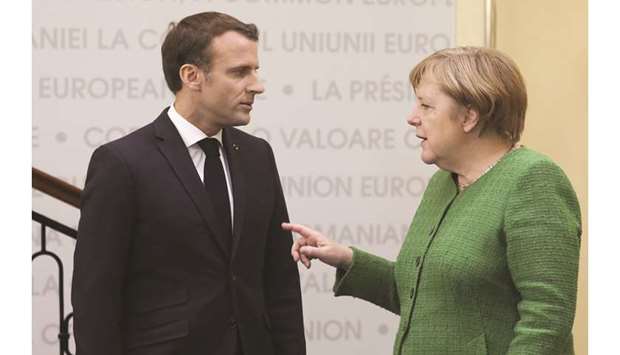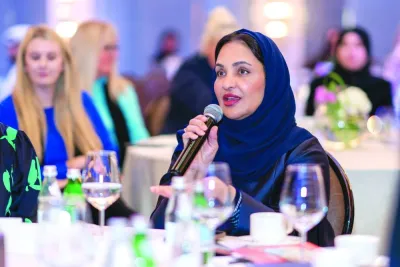German Chancellor Angela Merkel said yesterday that she and French President Emmanuel Macron “wrestle” on policy and have different outlooks, but tend to co-operate and find compromises in the end.
“Of course, we wrestle with each other,” Merkel said about relations between the core EU leaders who have disagreed recently on issues from how the bloc should handle Brexit to arms exports and climate policy.
“There are differences in mentality between us and differences in our understanding of our roles,” she added, speaking to the Sueddeutsche Zeitung and other European newspapers.
Asked whether her relationship with Macron had deteriorated in recent months, Merkel replied: “No. Not at all.”
Instead, Merkel insisted that Berlin and Paris agreed “naturally on the big issues”, adding that “this is how we accomplish much for Europe, even today”.
In Paris, Macron reacted by acknowledging “fruitful confrontations” with Merkel but said they result in compromises which allow the two nations to move forward together.
“I don’t want to believe in sterile confrontations or relations,” Macron said at a press conference. “I believe in fruitful confrontations, which means you propose something, you see how your partner responds, and together you try to find a compromise.”
He added: “What is expected of France in Europe ... is to reach a compromise with Germany in order to be able to move forward. That’s our history, it’s the heart of our relationship.”
France and Germany have traditionally been the duo at the heart of the European project and in January signed a new co-operation pact 53 years after the post-war Elysee Treaty.
However, Paris has voiced frustration that the reformist drive of Macron has been stalled by resistance from Germany, where veteran leader Merkel has been in power since 2005.
Merkel in the interview rejected the charge that she had been a brake on change in European policy.
“We always find a middle way,” the chancellor said, adding that Germany too had “launched a whole series of initiatives”, including in African development projects.
She said that “in the core questions – where is Europe going, the economy, what responsibility do we have for the climate and for Africa – we are on a very similar wavelength”.
The German leader cited as an example of Franco-German cooperation the “enormous progress” in defence policy, where “we decided to develop a fighter plane and a tank together”.
Merkel also said there had been cases of bad timing, pointing out that while Macron was pushing for major European reforms, she was engaged in half a year of coalition building after 2017 elections.
She did, however, point to different political cultures, saying: “I am the chancellor of a coalition government and much more committed to parliament than the French president, who is not even allowed to enter the National Assembly.”
Turning to this month’s European Parliament elections, Merkel said: “Many people are concerned about Europe – including myself. This means I feel even more duty-bound to join others in making sure that Europe has a future.”
Merkel said she supported German conservative Manfred Weber in his quest to become the next president of the European Commission, adding: “That does not mean Germany has no other excellent candidates for other positions.”
In separate remarks at a foreign policy lecture yesterday, Merkel said that she is pleased Britain wanted to remain involved in European security policy despite its planned exit from the EU.
“Wherever Britain is ready to co-operate, we should take the outstretched hand – that will make us stronger,” she told an audience in Ravensburg, in southwestern Germany.
On defence policy, Merkel said Germany’s restrictive guidelines on defence exports could leave its partners in despair.
To France’s irritation, Germany decided unilaterally last October – following the murder of Saudi journalist Jamal Khashoggi in Istanbul – to suspend arms sales to Saudi Arabia, its second largest market in the world after Algeria.
The German decision compromised existing and planned European defence projects.
“So here we, Germany, will have to be more ready to compromise to be considered at all as a partner,” Merkel said.

Macron and Merkel speak during the informal meeting of European Union leaders in Sibiu, Romania, earlier this month.


